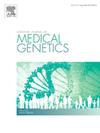Evaluating parental satisfaction and empowerment with genetic testing in the Neonatal Intensive Care Unit (NICU)
IF 1.7
4区 医学
Q3 GENETICS & HEREDITY
引用次数: 0
Abstract
Genetic disorders are highly represented in the neonatal intensive care unit (NICU). Genetic testing (in particular rapid genome-wide sequencing) has transformed the ability to diagnose and manage these infants. The NICU is a place of stress and overwhelm for parents and implementing genetic testing can pose additional challenges, including anxiety. There is a critical gap in knowledge related to parents’ empowerment and satisfaction with the NICU experience for those undergoing genetic testing. The goal of this mixed-methods study was to identify the key contributing factors related to empowerment and areas for improvement in care of parents undergoing genetic testing in the NICU by using validated tools that have not been previously implemented in Canada. A demographic survey and validated online survey tools were distributed to eligible parents. Descriptive statistics and linear regression analysis were performed. We conducted semi-structured interviews to gain insight into the genetic testing experience. The transcribed interviews were analyzed using an interpretive description framework and thematic analysis. A total of 31 surveys and 17 interviews were completed. We have identified self-reported demographic predictors of decreased satisfaction and empowerment for parents, including high income, English-speaking, ethnicity, sex of the parent, prematurity of the newborn, and length of hospital stay. Emerging themes from interviews fall under the broad category of communication and include information, logistics, parental perspective, and support. Subthemes include expectations and delivery of information, attention to timing and organization, comprehensive support, and parental distress and expectations when ordering genetic testing. The findings suggest the need for systematic improvement of the current genetic testing process in NICUs.
评估父母满意度和授权基因检测在新生儿重症监护病房(NICU)。
遗传性疾病在新生儿重症监护病房(NICU)中具有很高的代表性。基因检测(特别是快速全基因组测序)改变了诊断和管理这些婴儿的能力。新生儿重症监护室对父母来说是一个充满压力和压力的地方,实施基因检测可能会带来额外的挑战,包括焦虑。对于那些接受基因检测的人来说,在与父母的授权和对新生儿重症监护病房经验的满意度相关的知识方面存在着严重的差距。这项混合方法研究的目的是通过使用加拿大尚未实施的经过验证的工具,确定与在新生儿重症监护室进行基因检测的父母的护理相关的关键影响因素和改进领域。向符合条件的家长分发了人口统计调查和有效的在线调查工具。描述性统计和线性回归分析。我们进行了半结构化访谈,以深入了解基因检测的经验。使用解释性描述框架和专题分析对记录的访谈进行分析。我们共完成了31项调查和17次访谈。我们已经确定了自我报告的人口统计学预测因素,包括高收入、英语、种族、父母性别、新生儿早产和住院时间。访谈中出现的主题属于交流的大范畴,包括信息、后勤、父母的观点和支持。子主题包括期望和信息传递,对时间和组织的关注,全面的支持,以及父母在订购基因检测时的痛苦和期望。研究结果表明,需要系统地改进目前新生儿重症监护病房的基因检测过程。
本文章由计算机程序翻译,如有差异,请以英文原文为准。
求助全文
约1分钟内获得全文
求助全文
来源期刊
CiteScore
4.10
自引率
0.00%
发文量
193
审稿时长
66 days
期刊介绍:
The European Journal of Medical Genetics (EJMG) is a peer-reviewed journal that publishes articles in English on various aspects of human and medical genetics and of the genetics of experimental models.
Original clinical and experimental research articles, short clinical reports, review articles and letters to the editor are welcome on topics such as :
• Dysmorphology and syndrome delineation
• Molecular genetics and molecular cytogenetics of inherited disorders
• Clinical applications of genomics and nextgen sequencing technologies
• Syndromal cancer genetics
• Behavioral genetics
• Community genetics
• Fetal pathology and prenatal diagnosis
• Genetic counseling.

 求助内容:
求助内容: 应助结果提醒方式:
应助结果提醒方式:


